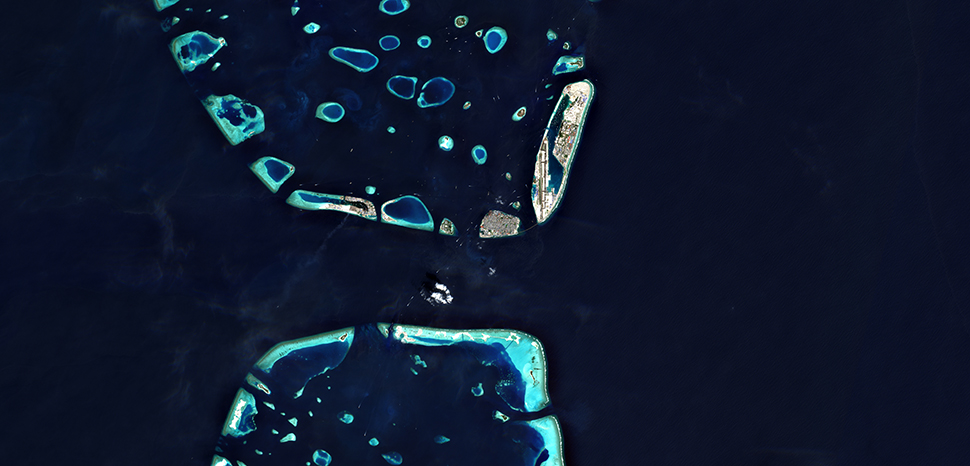India and the Maldives, two neighbors in South Asia, have had relations based on reciprocal alliance, implying mutual dependence. However, the hostile overtures emanating from the Maldives’ newly-elected president Mohamed Muizzu have created fault lines in the India-Maldives relations.
The geopolitical flux of the contemporary global order has caused India and the Maldives to predominantly identify themselves as two nations in the wider Indian Ocean Region and not just two neighbors in South Asia. This reset has brought its own challenges which are reflected in the increasing frictions between the two countries.
Situated just 70 nautical miles away from Minicoy and approximately 300 nautical miles from India’s West Coast, the Maldives holds a pivotal position in the maritime landscape. Its strategic location at the crossroads of major commercial sea-lanes traversing the Indian Ocean bestows upon it profound significance for India. The Maldives emerges as a crucial element in India’s maritime security calculus, serving as a linchpin in the overall security scenario within India’s periphery in the Indian Ocean. The strength and stability of the Maldives’ maritime domain are intricately intertwined with India’s broader security considerations in the region. As a result, fostering strong ties and ensuring the maritime well-being of the Maldives stands as a strategic imperative for India in safeguarding its interests and maintaining regional stability.
One crucial aspect underscoring the significance of the Maldives for India is its strategic importance in defense cooperation. Recognizing the strategic value of a secure Maldives, India has made substantial investments in bolstering the country’s security infrastructure, primarily through the comprehensive training of its defense forces. In fact, an estimated 70% of Maldives’ defense training is conducted by India, either on the islands themselves or within India’s esteemed Military Academies.
Over the past decade, India has demonstrated a steadfast commitment to enhancing Maldives’ defense capabilities by training more than 1,400 personnel from the Maldivian National Defence Force. The collaboration extends beyond training to the provision of critical resources, as the Indian Navy has supplied aircraft and helicopters to the Maldivian defense forces for aerial surveillance.
Looking ahead, India envisions establishing a coastal radar system in the Maldives, a strategic move aimed at vigilantly monitoring activities within the Indian Ocean. This proactive measure underscores India’s commitment to regional security and its recognition of the Maldives as a pivotal partner in safeguarding shared maritime interests.
While the Maldives holds strategic importance for India, India is crucial to the Maldives’ economy.
According to the World Bank, about one-third of the Maldivian economy is dependent on tourism. For the Maldives, India is the largest source country for tourists. The Maldives received 17,57,939 tourists in 2023. Out of these 2,09,198 were from India, implying that Indians accounted for around 12% of the total tourists in the Maldives in 2023. As the closest neighbor, India plays a pivotal role in driving tourist arrivals to the Maldives, with the number of Indian tourists experiencing a remarkable sevenfold increase over the past 12 years, spanning from 2011 to 2023.
The escalating market share emphasizes the growing reliance of the Maldives on Indian tourists as a crucial source of foreign currency. This dependence underscores the economic interconnection between the two nations, highlighting the importance of fostering and sustaining strong bilateral ties in the realm of tourism for the continued prosperity of the Maldivian economy.
On the trade front, India has significantly strengthened its position as a crucial trade partner for the Maldives. According to available data, India has consistently accounted for more than 10 percent of the Maldives’ overall imports since 2017. Notably, during the pandemic-ridden year of 2020, India emerged as the primary source of imports for the Maldives, contributing exports valued at $268.05 million. However, in 2021, India occupied the third position, following Oman and the UAE. Over the broader period from 2013-14 to 2022-23, India has exported goods totaling $2.6 billion to the Maldives while importing $644 million from the Maldives. Key components of Indian exports include essential items such as refined petroleum, edible vegetables, pharmaceutical products, iron and steel, cement, machinery, electrical appliances, and edible products of animal origin.
Beyond trade, India has become the preferred destination for Maldivians seeking specialized medical treatments and surgeries that may be either unavailable or limited in their home country. In 2021, Maldivians constituted the third-largest group of individuals visiting India for medical treatment. The popularity of India among Maldivians for healthcare stems from the factors of proximity, familiarity, and affordability. Moreover, India plays a pivotal role in providing higher education opportunities for Maldivian students, offering scholarships and facilitating enrollment in esteemed Indian institutions.
However, the Maldives appears to now be seeking to de-couple itself from India. There are two concerns arising out of Muizzu’s overtures after becoming the president.
First, Muizzu chose Türkiye as the first country to visit after becoming president. He broke the convention of earlier presidents of choosing India as their first country to visit after assuming office. The choice of Türkiye could be a cause of concern for India. Türkiye has been known to be involved in spreading radical ideology in India through funding various NGOs. Besides the proximity between the Maldives and Türkiye should also be monitored closely as the Maldives has the record of sending the highest per capita foreign fighters to the Islamic State (IS) in Syria and Iraq. The past one and the half decade has seen radical tendencies grow in the Maldives. The current political dispensation under Muizzu is seems to be supportive of radical ideology. This increases the threat perception for India from the Maldives.
Second, the heightened Chinese engagement in the Maldives also raises strategic concerns for India. This influence became notably evident during a recent state visit by Muizzu to China, where both countries took a significant step forward by elevating their relationship to the status of a ‘Comprehensive Strategic Partnership.’
However, compared to China, India has the natural geographical advantage. In the vast expanse of the Indian Ocean region, China grapples with the ‘tyranny of distance.’ To illustrate, the Maldivian capital, Male, lies approximately 6000 km away from the nearest Chinese port, Hainan, while it is only 700 km from the Indian port of Kochi. This significant variance in proximity underscores India’s strategic upper hand in this crucial part of the region, enhancing its geopolitical influence and positioning.
The views expressed in this article belong to the authors alone and do not necessarily reflect those of Geopoliticalmonitor.com.




